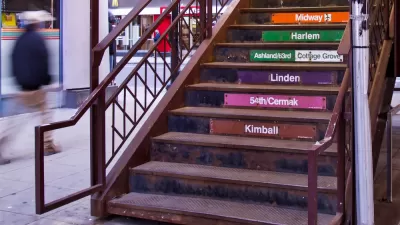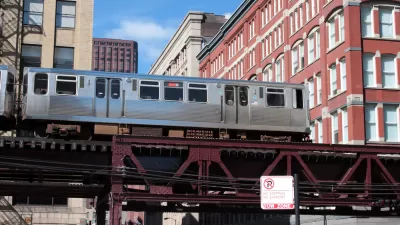Chicago's Mayor Emanuel's proposed tax would be used for the benefit of transit.

Mayor Rahm Emanuel's proposal to tax ride sharing services will help poor Americans, argues The Washington Post Editorial Board.
While many have touted ride sharing as an alternative to car ownership that might reduce traffic and vehicle miles traveled (VMT), the rise of services like Uber and Lyft seem to be doing the opposite. "Half or more of all ride-hailing trips would not have been made at all, or would have been undertaken by foot, bicycle or transit," according to The Washington Post. Keeping people off mass transit means less funding for transit and less investment in transit from those who can afford Uber. "In a new transportation study from the University of California at Davis, researchers confirm what many urban officials already suspected — that bus and rail-system passengers are also being lured away," according to The Washington Post.
"Services such as Uber are in fact generating traffic, then they are a mixed blessing and should be treated accordingly by policymakers," they write, concluding that, "it is equitable to raise revenue from services such as Uber, which are used disproportionately by wealthier passengers, for the benefit of transit, which serves a mass clientele."
Mayor Emanuel has been given the nickname Mayor One Percent, because his moves to remove services from poor areas and people in the city. The editorial suggests that this proposal might do something to temper that reputation.
FULL STORY: Want to help poorer Americans? Tax Uber

Alabama: Trump Terminates Settlements for Black Communities Harmed By Raw Sewage
Trump deemed the landmark civil rights agreement “illegal DEI and environmental justice policy.”

Planetizen Federal Action Tracker
A weekly monitor of how Trump’s orders and actions are impacting planners and planning in America.

Why Should We Subsidize Public Transportation?
Many public transit agencies face financial stress due to rising costs, declining fare revenue, and declining subsidies. Transit advocates must provide a strong business case for increasing public transit funding.

Understanding Road Diets
An explainer from Momentum highlights the advantages of reducing vehicle lanes in favor of more bike, transit, and pedestrian infrastructure.

New California Law Regulates Warehouse Pollution
A new law tightens building and emissions regulations for large distribution warehouses to mitigate air pollution and traffic in surrounding communities.

Phoenix Announces Opening Date for Light Rail Extension
The South Central extension will connect South Phoenix to downtown and other major hubs starting on June 7.
Urban Design for Planners 1: Software Tools
This six-course series explores essential urban design concepts using open source software and equips planners with the tools they need to participate fully in the urban design process.
Planning for Universal Design
Learn the tools for implementing Universal Design in planning regulations.
Caltrans
Smith Gee Studio
Institute for Housing and Urban Development Studies (IHS)
City of Grandview
Harvard GSD Executive Education
Toledo-Lucas County Plan Commissions
Salt Lake City
NYU Wagner Graduate School of Public Service





























